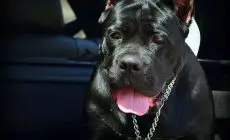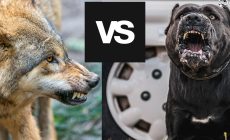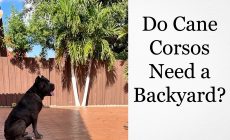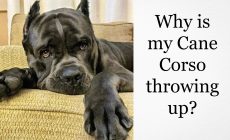Every dog smells, especially when wet, but if your Cane Corso smells more than others or smells extremely unpleasant, there may be an issue that needs to be addressed right away.
In this piece, we’ll look at seven possible causes of poor odor in your Cane Corso, so let’s get started right away.

1: Poor Hygiene
Using low-quality shampoo, avoiding bathing your Cane Corso, and not combing his coat for a long time might cause your Cane Corso to smell terrible.
Just like humans, dogs require grooming and bathing to be clean. Lack of bathing and grooming can lead to the accumulation of dirt, oils, and bacteria on their skin and coat.
While you should not bathe your Cane Corso more than once a week, brushing him on a regular basis is essential.
Brushing improves the distribution of natural oils, gets rid of dead fur, clears debris, and reduces shedding.
Use only premium shampoo, like Paws & Pals Oatmeal, Burt’s Bees Oatmeal Shampoo with Colloidal Oat Flour & Honey for Dogs, and Sweet Basil & Turmeric Shampoo.
What To Do?
- Use only high-quality shampoo and products to bathe your dog.
- Brush his coat regularly.
- Check his coat daily to find if there are any ticks and mites present.
2: Skin Infection
Skin infections can be quite irritating for your Cane Corso, causing him to itch frequently and lose hair.
Any form of skin infection can alter your dog’s body aroma, and you might notice a musty or cheesy odor emanating from his body.
Unfortunately, skin infections can affect every dog in the world; they are not confined to specific dog breeds; but, because Cane Corsos do not have folded skin, they are less likely to develop certain skin diseases and are easier to clean.
Moreover, thicker skin, also known as “elephant skin,” flaky, crusty, or scaly skin, redness and itching, and hyperpigmentation are signs of skin infections.
If you see any of these signs, get in touch with a veterinarian right once. You may also read this post for more information.
What To Do?
- Meet an expert if the infection is severe.
- Use antiseptic shampoo and the medicine suggested by your vet.
- Avoid giving Grains and Fillers, Highly Processed Foods, and sugary foods until the condition gets better.
3: Ear Infection
If you have had your Cane Corso’s ears cropped and often check his ears, an ear infection is highly unlikely.
Cane Corsos generally have a low risk of developing such a problem, but some individuals of this breed might catch this issue due to the owner’s negligence, polluted environment, and underlying illness.
Ear infections can make your Cane Corso smell, and if your Cane Corso is struggling with this infection, you may notice him shake his head and scratch his ears to relieve the discomfort.
The ears often become red and inflamed.
If the infection is severe, contact a vet. Also, you may read this guide for more information on dog ear infections.
What To Do?
- Regular cleaning.
- Manage moisture as excess moisture in the ear can boost bacterial or yeast production.
- Meet an expert if the infection is severe.
4: Dental Issues
Cleaning your dog’s mouth is equally important as cleaning his coat. Dogs, like humans, can have terrible breath, particularly when they have a tooth problem.
Examine your Cane Corso’s teeth to determine if any are loose, if anything is lodged in them, or if his gums are swollen.
Your dog may exhibit discomfort from tooth problems, including excessive drooling, decreased interest in eating dry or difficult-to-chew food, and slower-than-usual chewing. If your dog exhibits any of these symptoms, do not ignore them; instead, take appropriate action or consult a specialist.
In order to prevent tartar buildup, be sure to frequently brush your dog’s teeth with the best dog toothbrush and toothpaste.
What To Do?
- Brush your dog’s teeth twice every day as it removes plaque and tartar buildup.
- Buy dental chews and toys
- Provide a healthy diet
5: Rear Gland Issues
Anal sacs, also known as anal glands, are tiny sacs found on each side of a dog’s anus. These sacs are significant because they contain specialized sweat glands that create an unpleasant-smelling fluid that serves as a scent identifier for dogs.
You may be wondering why dogs smell each other’s buttocks when they meet. The scent of your dog’s anal glands can communicate significant chemical information to other canines.
If your Cane Corso has been persistently licking his rear end or sliding his bottoms on the ground to ease itching, it is likely that his anal sacs have become infected.
Big dogs, such as Cane Corsos, are not prone to anal sac disease, it mainly affects smaller breeds.
What To Do?
- Meet a vet.
- You can reduce the pressure on their anal glands by providing a warm compress.
6: Poor Diet
Your Cane Corso’s body odor is heavily influenced by his or her diet. A cheap meal low in essential nutrients, particularly protein, can not only weaken your Cane Corso’s fur, but it may also leave him susceptible to skin sickness and unpleasant odor.
In fact, a dog that does not eat well would smell bad even after regular bathing.
So, the food should not be poor in quality; Cane Corsos requires a protein-rich diet for optimal growth.
What To Do?
- Get your dog the best food possible; stay away from cheap, discounted brands. Before purchasing anything, read reviews and talk to your veterinarian.
7: Seborrhea
A dog with seborrhea, a skin condition, may smell terrible. This disorder causes the sebaceous glands on a dog’s skin to overproduce sebum, which results in scaly, flaky, itchy, and red skin.
Seborrhea, however, is not a serious illness and can be managed by medical professionals. Additionally, Cane Corsos are not prone to experience this condition, however, act quickly if you see any of the symptoms of seborrhea in your dog, such as flaky, itchy, or red skin. You can speak with a veterinarian or use anti-seborrheic shampoo.
What To Do?
- Using an anti-seborrheic shampoo containing coal tar and salicylic acid, can be an effective way of treating Seborrhea, however, before using any product, contact your vet.
Conclusion
Every dog smells, but if your Cane Corso smells more than others, there may be an issue that needs to be addressed immediately.
Cane Corsos are not prone to bad smells, but if they have a skin illness, ear infection, tooth issue, or rear gland problems, they may smell rather awful.
With the proper care, you can treat your Cane Corso’s foul odor at home.
However, if the odor is extremely bad and your Cane Corso is exhibiting evident indications of distress, such as lethargy, pacing, yelping, excessive scratching, etc, you should contact a veterinarian as soon as possible. Ignoring such symptoms might be detrimental to your cane corso.
I hope you liked this post.
Thanks for reading!







